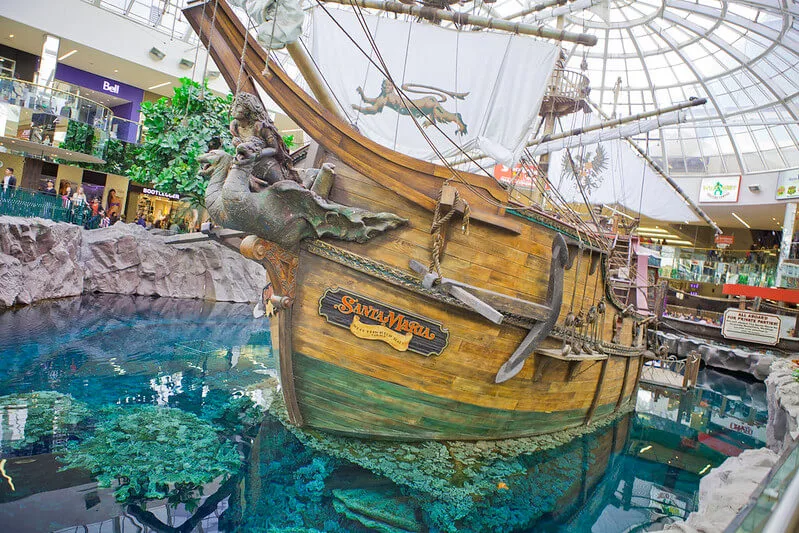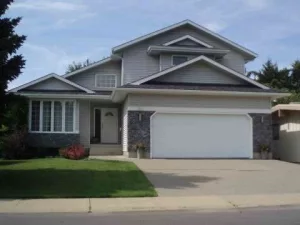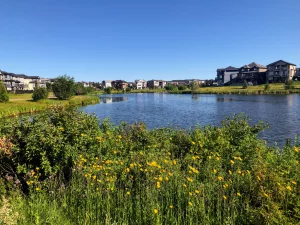Thinking about moving to Edmonton, Alberta? Or maybe you’re already on your way? More than 30,000 new people are expected to arrive in the city in 2024. Will you be one of them?
If you’ve heard about Edmonton from other people, you might have some misconceptions. Yes, the winters are long and cold. And, yes, we also have a very, very big mall.

But there’s a lot more to Edmonton than that. In fact, there’s a lot to Edmonton that a lot of people don’t really “get” until they live here. Unlike cities like Vancouver or Toronto, which maybe do a better job of selling themselves, Edmonton is a city that many residents come to love for its amazing river valley, its festivals and culture, and the opportunity and relative affordability of the city.
So, whether you’re moving to Edmonton from Vancouver, Toronto, another Canadian city or from much farther away, let’s take a look at everything you might want to know before you start thinking about where to rent or buy a house in Edmonton.
Key Facts About Edmonton
Who lives in Edmonton?
As of 2022, Edmonton’s population tops 1.1 million, making it the second-largest city in the province (after Calgary) and the sixth-largest metropolitan area in Canada. There are actually a lot of people living here! Because it’s so spread out, it doesn’t feel particularly crowded and you would have a hard time guessing the population of Edmonton. I know, I know this isn’t Vancouver or Toronto. And thank goodness for that. What a crush. If you want some space to yourself, this is a great option. You aren’t living in a small town, but you aren’t in a metropolis.
It’s also a very diverse population, with about 40% of the population identifying as a visible minority, with significant populations of people from East and Southeast Asia, South Asia, Africa, and Latin, Central and South America.
Where is Edmonton located?
Edmonton is located about 300 km North of Calgary, in the center of the province. It’s situated along the beautiful North Saskatchewan river, and is about a 3.5 hour drive to two of the most amazing national parks in the world, Banff National Park and Jasper National Park. It’s also within day-tripping distance of dozens of provincial parks and recreation areas. For outdoor enthusiasts, that means lots of opportunities for just about every kind of outdoor recreation imaginable all year round
Edmonton is on the prairie. If you haven’t grown up on the prairie, you probably think it’s boring. Flat. Featureless. In fact, it’s very beautiful here, you just need to know what you’re looking at. Plus, the Edmonton river valley isn’t really the prairie. There’s a lot of topography and it is fantastic. I grew up near Ramsay Ravine in the west end and we were in there all the time. It’s green and leafy and fantastic for cycling and tobogganing.
Edmonton Time Zone and Weather
Edmonton is in the Mountain Daylight/Mountain Standard time zone. Mountain Daylight Time is observed from April to October; in November, the clocks are set back one hour for Daylight Savings Time and turned forward again in March. That means you can fly to Puerto Vallarta without missing any sleep!
As for the weather, although Edmonton is known for cold winters. It can get very cold. Like -35 degrees celsius, although the average is much warmer. And that’s great because all the bugs die and you get a break from the warm weather. Who wants it the same all the time? Move to California and turn your life beige. I’ll take four seasons, thank you. What we do still have in the wintertime though is sunshine, unlike more temperate cities. Edmonton also has more hours of sunshine per year than any other Canadian city. In fact, daylight spans as long as 17 hours during the summer months.
In the summer, it can get hot. In recent years, it’s been very hot. I don’t think there are as many places in the world that can swing 70 or 75 degree temperature difference from winter to summer in a given year. We can, though. That means you’ll need to wear a hat and maybe even run the air conditioning. But it’s a short season, and most people revel in it no matter how hot it gets.
Edmonton Economy
Economic conditions in Edmonton, and in Alberta in general, are a big draw for many people considering a move to this city. As of 2020, median family income in Edmonton was $112,000; the average for the same year is $110,600. That compares favorably to Canada-wide statistics.
In 2024, Alberta’s unemployment rate hovered at around 6%, and Alberta is forecasting labor shortages by 2030 in a number of occupations, which suggests demand for new workers.
Alberta is also the only province with no provincial (PST) or harmonized sales tax (HST), and has the lowest overall taxes in Canada. This makes Edmonton an affordable choice on a number of different levels.
Edmonton Real Estate and Affordability
Speaking of affordability, Edmonton is one the most affordable cities in Canada for housing. According to March 2024 statistics from the Realtors Association of Edmonton, the average price of a home in Edmonton is $407,458, with detached homes averaging $508,411 and semi-detached units averaging $385,163. It is still possible to buy a townhouse in Edmonton for less than $300,000 and condominium average prices sit at $181,347. Go and compare that to other cities like Toronto or Vancouver! People are often amazed at how much they can get for their money in this town. Edmonton’s residential neighborhoods are also beautiful, diverse and offer a range of amenities.
Edmonton’s rental market is also one of the most affordable compared to other large Canadian cities. In 2023, average rent for an unfurnished one-bedroom apartment in Edmonton was $1,143. That’s less than half the cost of similar properties in Vancouver or Toronto. Edmonton is also one of the rare cities where the monthly financial costs of buying are less than renting.
Overall, the cost of living in Edmonton is estimated to be cheaper than 79% of cities in North America. And, while the cost of food is above average compared to the rest of Canada, the cost of transportation, housing and healthcare fall well below average.
Working in Edmonton
We’ve mentioned that Edmonton has a strong economy overall, but it can be helpful to look at what kinds of jobs are available. Edmonton’s key economic sectors are:
- Technology and innovation
- Energy and sustainability
- Health and life sciences
- Agriculture and agribusiness
- Advanced manufacturing
- Education
And, although oil and gas is one of the largest industries across the province, there are also lots of opportunities in commercial banking, colleges & universities, and the automobile industry, among others. Edmonton is also home to 21 of the largest companies in Alberta, and some of its top employers, including:
- Alberta Blue Cross
- Alberta Health Services
- Alberta Motor Association
- Covenant Healt
- DynaLife
- Edmonton Public School District
- Government of Alberta
- MacEwan University
- Northern Alberta Institute of Technology
- PCL Construction
- Servus Credit Union
- Stantec
- University of Alberta
- Workers’ Compensation Board
A strong jobs increase is predicted for 2024 and 2025.
Edmonton Schools
For a lot of people considering moving to Edmonton, education is a major consideration, either for themselves or for their children. For those with children in Kindergarten through grade 12, there are a few options.
Edmonton Public School System
Edmonton Public Schools admit any student who lives in Edmonton. It includes about 212 schools educating 106,000 students.
Edmonton Catholic School System
The second-largest publicly financed school system, with 96 schools and 43,000 students. (Note that Edmonton Catholic does admit non-Catholic students.)
Le Conseil Scolaire Centre-Nord
A Francophone school system open to Francophone students or students with a parent whose first language is French.
Charter Schools
Schools that aim to provide education in an “innovative or enhanced way” and contribute to educational choice.
Private Schools
A mix of school types here, including religious and cultural institutions.
Edmonton is also home to a number of high-quality post secondary institutions including:
- University of Alberta
- MacEwan University
- Concordia University of Edmonton
- The King’s University
- Northern Alberta Institute of Technology
- Norquest College
- Yellowhead Tribal College
Transportation and Getting Around
In general, Edmonton is a city built for cars. Yes, there is plenty of public transit, but the city’s large land mass can make public transit more difficult, depending on the area in which you decide to live. Edmonton’s Public Transit Service serves some areas quite well, though, especially in the downtown core and University area. Edmonton is also in the process of building out its light rail transit system, which is expected to better serve Edmonton’s public transit needs when it’s completed over the coming years.
Because of its more than 150 km of river valley trails and network of city bike lanes, Edmonton also has a sizable population of bike commuters, even in the winter!
Ridesharing apps like Uber and Lyft also exist, as well as several taxi services.
For a quick trip, Edmonton also has e-scooters! (They’re fun.)
Edmonton Life: Culture and Things to Do
Edmonton tends to get labeled as boring compared to cities like Toronto and Vancouver. And, no, it doesn’t have the downtown scene or nightlife that those cities have. But Edmonton is rich with activities and attractions.
Festival City
One thing that stands out when it comes to things to do in Edmonton is festivals. Edmonton is called the “festival city,” and with more than 50 festivals a year, it’s earned its name. There is something for everyone here, but some of the standout festivals Edmotnon is most known for include:
Edmonton Folk Music Festival
One of the premier festivals of its kind in the world, drawing musicians of all types. (You’ll see me and my family here every year.)
Edmonton Heritage Festival
The world’s largest three-day multiculturalism celebration. It’s a great place to sample cuisines from all over the world – and get a sense of all the different cultures that co-exist in the city.
Edmonton International Street Performers Festival
A 10-day festival of live street performances in the downtown core.
K-Days
Edmonton’s summer carnival and exhibition.
Edmonton International Fringe Theatre Festival
The largest, longest-running Fringe Festival in North America, “The Fringe” includes hundreds of theatre shows as well as outdoor artists, food and a quirky festival atmosphere. There are also loads of outdoor attractions.
Outdoor Recreation
Edmonton is an amazing city for outdoor recreation. Edmonton’s parks and ravines make it a great place for all kinds of outdoor fun, including running, walking, biking, canoeing or golf in the summer; and lots of opportunities for skiing, skating and snowshoeing in the winter. Spend some time in Edmonton and you’ll see that it’s a pretty fit and active population!
Shopping
No list of Edmonton attractions would be complete without mention of West Edmonton Mall, North America’s largest Shopping Center. It isn’t for everyone, but as a destination with more than 800 stores, 100 eateries, two hotels, and attractions like an amusement park, indoor waterpark, golf course and full-sized replica of a pirate ship, it is definitely something to behold.

Image: Flickr/GoToVan
Edmonton has other shopping destinations, though. You can check out Whyte Avenue for trendy independent retailers and some of the best restaurants in town. And the 124th street and High Street are also home to many smaller retailers.
Edmonton also hosts several farmers’ markets, both indoor and outdoor, year-round.
Sports
Edmonton is an active city of sport-lovers. It’s home to a number of top-tier sports teams to cheer for, including the Edmonton Oilers, Edmonton Oil Kings, Edmonton Stingers, Edmonton Elks, Edmonton Riverhawks and FC Edmonton. If you’re into sports and athletic pursuits, Edmonton’s program of events continue to expand. In 2023, Edmonton was named the 38th best sporting city in the world!
Culture
Edmonton may not come to mind as a city of arts and culture, but it has a lot going for it. In addition to a number of festivals that fall under this umbrella, Edmonton is also home to the Winspear Center, a world-renowned performance venue, the Art Gallery of Alberta and a number of other theaters, galleries and art installations.
But what’s Edmonton really like?
Hey, we can share all the statistics and links in the world, but if you’re considering moving to Edmonton, you are probably also keen to know what it’s really like to live here.
Yes, the winter can be brutally cold. But it’s beautiful and filled with winter festivals, skiing, skating, hockey and cozy things to do.
Yes, it’s a very large city geographically, which gives it much less of a metropolitan feel than cities like Toronto, Vancouver or even Calgary. But it’s also home to the largest stretch of urban parkland in North America, with more than 150 km of trails.
Yes, its size makes it more of a driving city; using public transport for long distances can be difficult and time consuming. But parts of Edmonton are also great for walking and bike commuting (even in winter!). It’s just something you need to take into account when you decide how and where you want to live.
And Edmonton is great for families. It is full of opportunities for kids to explore, play and learn, including lots of free and low-cost options via the City of Edmonton and local community leagues.
Most people who live in Edmonton stay for a reason. It’s safe. It’s affordable. It’s a place where people can put down roots.
Is it worth it to move to Edmonton?
I was born in Edmonton and have lived here my own life. I think it’s a great place to live. A lot of people would disagree, but that’s because they have no idea what they are talking about;-) You have to live here to understand.
Is moving to Edmonton a good idea?
That depends on why you’re moving, but Edmonton has lots of opportunity for newcomers. Edmonton’s subreddit has lots of takes on how people who’ve made the move feel about it.
What salary do you need to live in Edmonton?
A living wage for a dual income family of four living in Edmonton is calculated at $18.10 per hour in 2021. That works out to an annual salary of about $37,000 for each person. Minimum wage in Alberta is $15 per hour.
What is the nicest area in Edmonton to live?
It really depends on what you want? Are you looking for quiet suburbs or a more bustling urban environment? What kind of a home floats your boat? Where do you work? How do you commute? Edmonton neighborhoods have all different types of pros and cons. If you’re looking to buy, let me help you find the right one for you.

